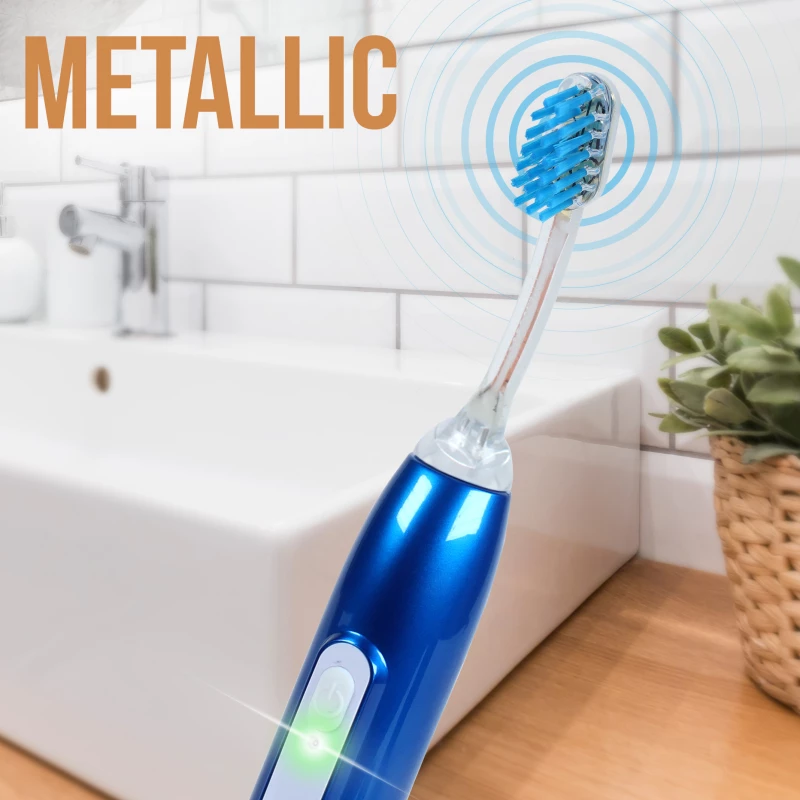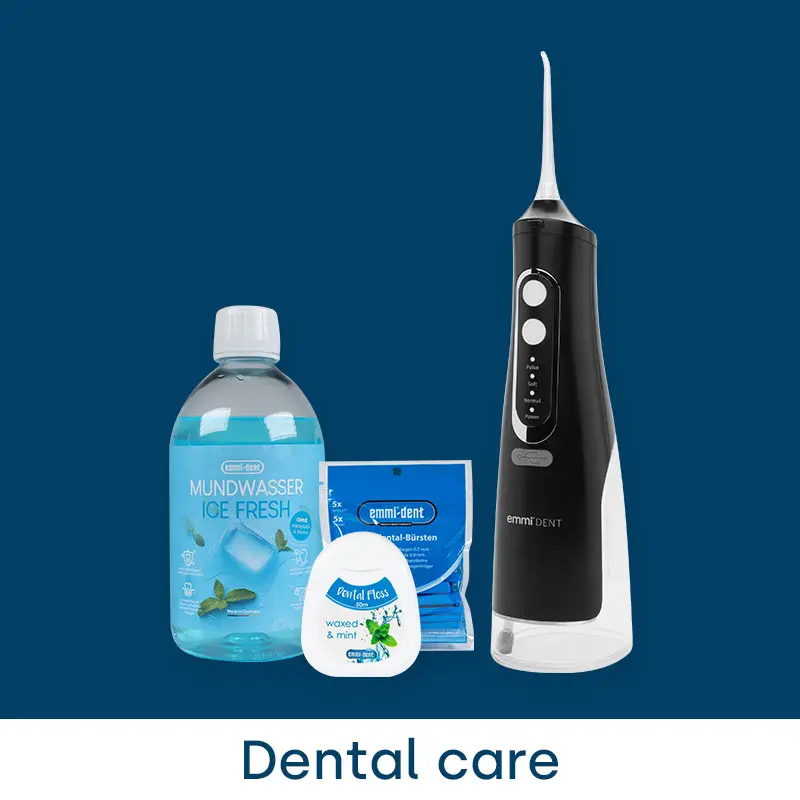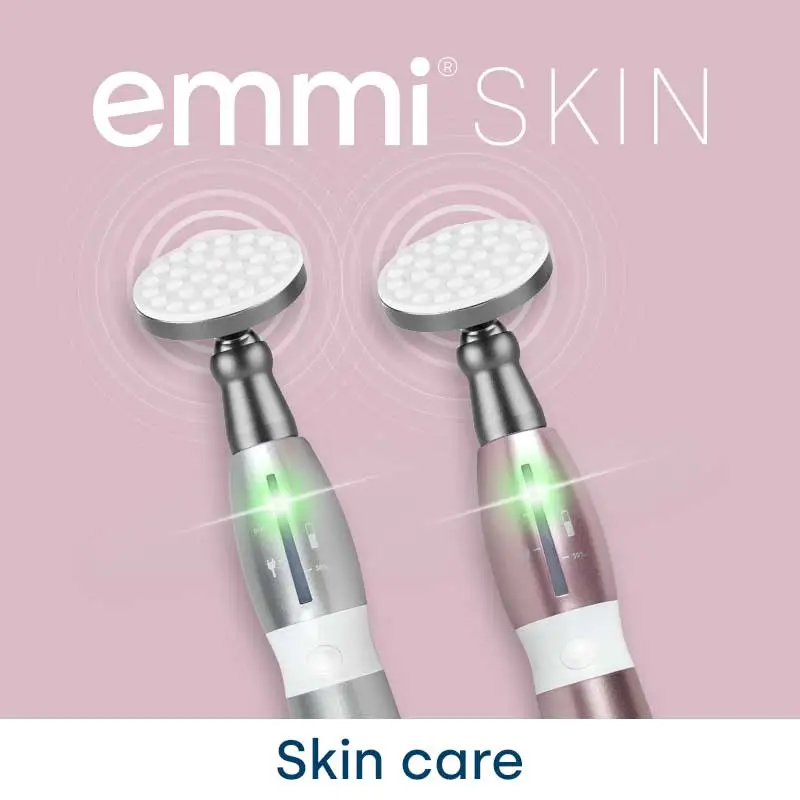
Good dental health is essential for your general well-being. Tooth sensitivity, also known as dentine hypersensitivity, affects many people and can cause considerable discomfort. In this article, you will learn everything you need to know about the causes, symptoms and treatment options for tooth sensitivity as well as preventive measures.
Causes of tooth sensitivity
Tooth sensitivity can be triggered by various factors. It is important to identify the exact causes so that appropriate measures can be taken. The 6 most common causes of tooth sensitivity include:
1. erosion of the tooth enamel
The loss of tooth enamel is a common cause of sensitive teeth. This can be caused by consuming acidic foods and drinks such as citrus fruits and soft drinks. Acids attack the tooth enamel and make the underlying dentine sensitive. Regular brushing immediately after consuming such foods can exacerbate the effect, as the enamel is particularly soft in this state.
2. gum disease
Diseases such as gingivitis and periodontitis often lead to gum recession, which exposes the sensitive tooth necks and leads to tooth sensitivity. Bacterial infections in the gums cause inflammation and can destroy the tissue that supports your teeth.
3. tooth wear
Bruxism, i.e. grinding your teeth at night, and incorrect brushing techniques can wear down the enamel and make your teeth sensitive. Frequent chewing of hard foods and the use of whitening toothpastes that contain abrasive particles also contribute to wear and tear.
4. dental treatments
After dental procedures such as fillings or the insertion of dentures, teeth can temporarily react sensitively. However, this sensitivity should subside over time as the tooth recovers and adapts.
5. cracks in the tooth
Cracks in the tooth caused by injury or dental trauma can expose the dentin and cause severe pain. Small cracks can also be caused by everyday activities such as biting on hard objects.
6. tooth root exposure
Gum recession can expose the roots of your teeth, leading to tooth sensitivity. The exposed roots are sensitive to temperature changes and touch as they are less protected by enamel.
Symptoms of tooth sensitivity
As you have now learnt, tooth sensitivity manifests itself in different ways. The symptoms can range from mild discomfort to severe pain and vary depending on the trigger. However, the 4 most common symptoms include
1. pain with temperature changes
You may be familiar with it? Sensitive teeth often react to hot and cold food or drinks with stinging pain. This reaction occurs because the nerves in the exposed dentine react directly to changes in temperature.
2. pain with sweet or sour foods
Sweet and acidic foods can also cause painful reactions. Contact with such substances can irritate the exposed dentinal canals.
3. discomfort when brushing teeth
Brushing your teeth can also be uncomfortable if you have sensitive teeth, especially if you use a hard toothbrush or the wrong technique. This often leads to you avoiding a thorough cleaning, which can make the situation worse.
4. short, stabbing pain
However, tooth sensitivity is also characterised by short, sharp pains that occur with certain stimuli. This pain is often sudden and intense, but quickly disappears as soon as the stimulus is removed.
These four symptoms are among the most common symptoms of tooth sensitivity and can significantly impair the quality of life of those affected. They require targeted treatment to alleviate tooth sensitivity and prevent it in the long term.
Diagnostics of tooth sensitivity
Have you noticed any of these symptoms? Then you should see a dentist as soon as possible, because only an accurate diagnosis is the key to effective treatment of tooth sensitivity. It is also important to make your own observations in order to incorporate them into the diagnosis. This is the only way to accurately identify the causes of your symptoms and take the right measures.
Step 1 - Carry out self-observation and note complaints
Observe carefully when and during which activities the pain occurs. This will help you to recognise patterns and triggers. Make a note of which foods or drinks cause the pain. Are they perhaps particularly
- hot,
- cold,
- sweet or
- acidic foods?
Also pay attention to whether certain times of day play a role - does the pain occur more often in the morning or evening, for example? These observations are valuable information for your dentist and can make the diagnosis much easier.
Step 2 - Visit to the dentist for a professional diagnosis
A dentist can determine the exact causes of your tooth sensitivity through a thorough examination. This includes
- Cold tests, in which the reaction of your teeth to cold stimuli is checked;
and
- X-rays to detect structural problems or caries.
The dentist will also check your dental care habits and advise you on a gentler technique or special products if necessary.
In addition, the dentist can use other diagnostic methods to ensure that no serious dental diseases are present. He can
- Apply sealants and varnishes to protect sensitive areas;
or
- recommend special fluoride-containing treatments that strengthen the enamel and reduce sensitivity.
If necessary, fillings or inlays can also be used to repair and protect damaged or sensitive areas of the tooth.
By combining self-observation and professional diagnostics, you can develop a comprehensive treatment strategy that will help you to alleviate tooth sensitivity in the long term and improve your dental health.
Solutions and treatment options for tooth sensitivity
There are various approaches to treating tooth sensitivity. From special dental care products to professional treatments at the dentist, there are many ways to alleviate discomfort and improve dental health. Below we present 4 proven solutions:
1. dental care products
Use special toothpastes and mouthwashes for sensitive teeth that contain desensitising ingredients. These products can soothe the nerves in your teeth and reduce sensitivity. There are numerous toothpastes on the market that have been specially developed for sensitive teeth and contain ingredients such as potassium nitrate or strontium chloride. These substances help to block the nerves in the teeth and thus reduce sensitivity to pain. Mouthwashes with similar desensitising agents can also be helpful, as they also reach areas of the mouth that are difficult to access.
Another effective dental care product is our emmi-dent ultrasonic toothbrush. Our special toothbrushes use ultrasonic technology to reduce plaque and harmful bacteria without mechanically irritating the teeth. The gentle cleaning action is gentle on sensitive teeth and gums, which is particularly beneficial for people with tooth sensitivity.
2. fluoride treatments
Fluoride is a proven means of strengthening tooth enamel and can help to reduce sensitivity. Regular applications of fluoride gel or fluoride mouthwashes can protect the tooth necks and reduce sensitivity. These products are often available over the counter in pharmacies. In addition, many dental practices offer professional fluoride treatments, where highly concentrated fluoride gel or varnish is applied directly to the teeth. These treatments can be particularly effective in strengthening the protective layer of tooth enamel.
3. professional treatments by the dentist
If dental care products alone are not enough, your dentist can offer various professional treatments. Sealants and varnishes can be applied to sensitive areas of the teeth to provide additional protection. In more severe cases where the dentin is exposed, fillings or inlays may be required. These procedures seal the sensitive areas and prevent stimuli from reaching the nerves. In addition, your dentist can perform special desensitising treatments using substances that calm the nerves of the tooth and reduce sensitivity to pain.
4. home remedies and natural solutions
In addition to commercial products and professional treatments, there are also numerous home remedies and natural solutions that can provide relief. Coconut oil pulling is a traditional method where you swish a tablespoon of coconut oil back and forth in your mouth. This can help to reduce bacteria and strengthen the gums. A tooth-healthy diet rich in vitamins and minerals can also help to strengthen tooth enamel and reduce sensitivity. For example, foods rich in calcium and vitamin D are particularly beneficial for dental health.
By combining the different approaches and using them regularly, you can alleviate the sensitivity of your teeth in the long term. It is also very important that you work together with your dentist to develop the best strategies for your individual needs.
Prevention of tooth sensitivity
Preventive measures are the best way to avoid tooth sensitivity in the long term. Good oral hygiene and healthy habits play a key role in this. Please note the following three points to preventively adapt your oral hygiene to tooth sensitivity:
1. regular dental care for tooth sensitivity
Ensure thorough and gentle dental care to maintain the long-term health of your teeth. Use a soft toothbrush that is gentle on the gums and brush in gentle, circular movements so as not to wear away the enamel unnecessarily. An electric toothbrush can be particularly helpful here, as it enables even and effective cleaning. Our emmi-dent ultrasonic toothbrush in particular is a good choice, as it can significantly reduce plaque and harmful bacteria without exerting mechanical pressure on the teeth. Supplement your dental care routine with the regular use of floss or interdental brushes to keep the spaces between your teeth clean and reduce the risk of tooth decay and gum disease.
2. dietary habits for tooth sensitivity
Your diet also has a great influence on the health of your teeth. Reduce your consumption of acidic foods and drinks such as citrus fruits, soft drinks and wine, as these can attack tooth enamel. Instead, make sure you eat a tooth-healthy diet rich in calcium and phosphate. These minerals help to strengthen tooth enamel and help to make teeth more resistant to acid attacks. Foods like
- Dairy products,
- green leafy vegetables,
- Nuts and fish
are excellent sources of calcium and phosphate. Also drink plenty of water to encourage saliva production, which naturally cleans and protects teeth.
3. regular visits to the dentist
Regular preventive check-ups at the dentist are essential to recognise and treat dental problems at an early stage. Visit your dentist at least twice a year for a professional dental cleaning and examination. The dentist can
- Caries,
- Gum disease and
- other problems
and treat them at an early stage. They can also carry out special treatments to strengthen the enamel, such as fluoride treatments or sealants. These measures help to protect your teeth from sensitivity and tooth decay. Your dentist can also give you individual recommendations on how you can further optimise your dental care to prevent tooth sensitivity.
Long-term effects and dealing with chronic sensitivity
Chronic tooth sensitivity can significantly affect your quality of life. But don't worry, because long-term strategies and lifestyle adjustments can help reduce teeth sensitivity and help you deal with it better. Follow the 3 points below and benefit from tooth sensitivity.
1. chronic tooth sensitivity
Chronic tooth sensitivity can significantly affect your quality of life. It is important to develop strategies to manage the problem effectively. This includes both medical and behavioural approaches. Regular dental care with products specifically designed for sensitive teeth can help to alleviate the symptoms. Using our emmi-dent ultrasonic toothbrush and avoiding abrasive toothpastes are also recommended. In addition, regular visits to the dentist and professional fluoride treatments can reduce the sensitivity of your teeth.
2. long-term strategies and lifestyle adjustments
To deal with tooth sensitivity in the long term, you should make some adjustments to your lifestyle. These include a balanced diet rich in calcium and phosphate to strengthen tooth enamel. Avoid excessive consumption of acidic foods and drinks, as these can further erode tooth enamel. Be sure to wait at least 30 minutes after consuming such foods and drinks before brushing your teeth to prevent further damage.
3. psychological aspects
Chronic toothache can also negatively affect your eating behaviour and your enjoyment of life. Pain of this kind can cause you to avoid certain foods, which can affect your diet and well-being. In addition, constant pain and discomfort can also lead to stress and anxiety, which can have a further negative impact on your quality of life. In such cases, it can be helpful to seek professional counselling and support. A dentist or pain therapist can teach you techniques and strategies to better manage pain and improve your quality of life. Relaxation techniques such as meditation and breathing exercises can also help to reduce stress and alleviate the perception of pain.
In our view, dealing with chronic tooth sensitivity always requires a holistic approach that includes both medical and behavioural measures;











